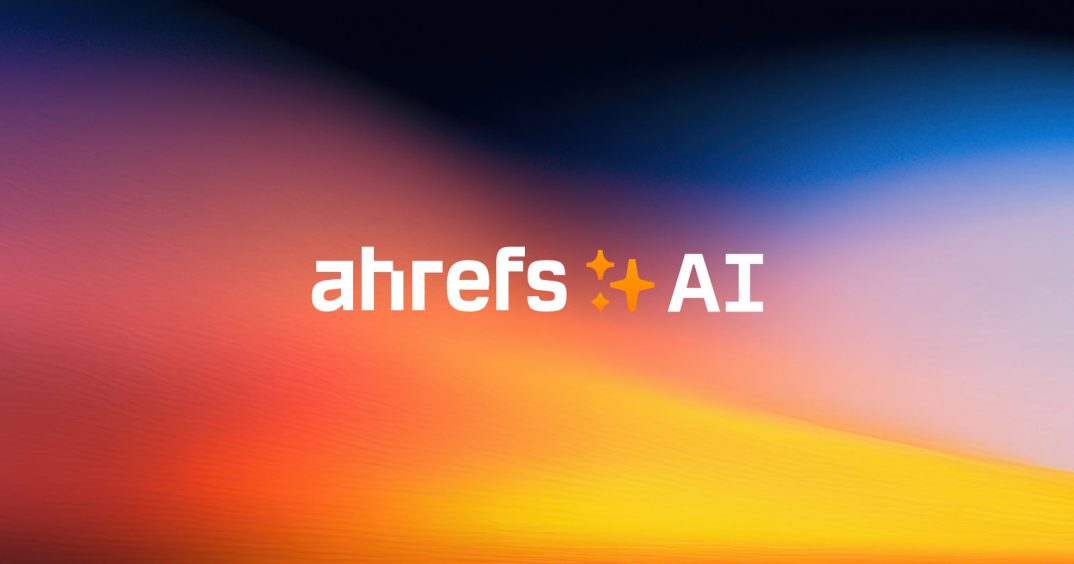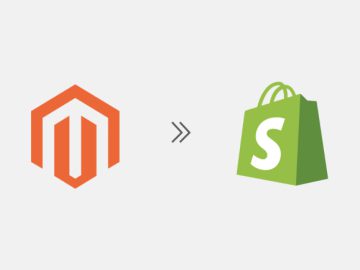This post was sponsored by Ahrefs. The opinions expressed in this article are the sponsor’s own.
Having the right SEO AI tools in your martech stack can help you:
- Streamline your content production.
- Automate complex SEO processes.
- Do less “busy” work and more stuff that moves the needle.
- Take the guesswork out of your strategies.
At Ahrefs, we’ve been hard at work releasing AI features that will give you a competitive edge you can’t get anywhere else.
Check out how to automate your content and SEO workflows with Ahrefs’ AI capabilities.
In This Guide
- 1. AI Seed Keyword Suggestions
- 2. AI Keyword Intents
- 3. AI Content Helper
- 4. AI Content Grader
- 5. AI Keyword Translator
- 6. (Bonus) Patches: Fix Annoying Tech Issues With AI
- 7. Try Out These Ahrefs AI Features Today
1. AI Seed Keyword Suggestions
When doing keyword research, it’s a fairly common practice to start by searching for your main topic, product, or service.
For instance, if you’re in the gardening niche, you and your competitors will likely compete quite heavily on keywords containing the word “gardening.”
To find untapped opportunities, you can try out the AI keyword suggestions in Ahrefs’ Keywords Explorer.
Screenshot from Ahrefs, Nov 2024
You can either select an existing preset or add your own prompt:
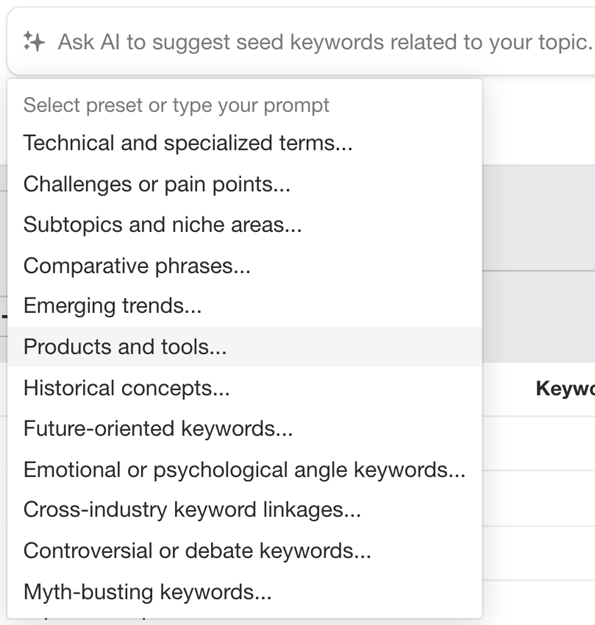 Screenshot from Ahrefs, Nov 2024
Screenshot from Ahrefs, Nov 2024
With either option, this tool’s benefit is generating a list of unique content ideas your competitors have likely not considered.
For example, check out the technical and specialized keyword ideas related to “gardening”:
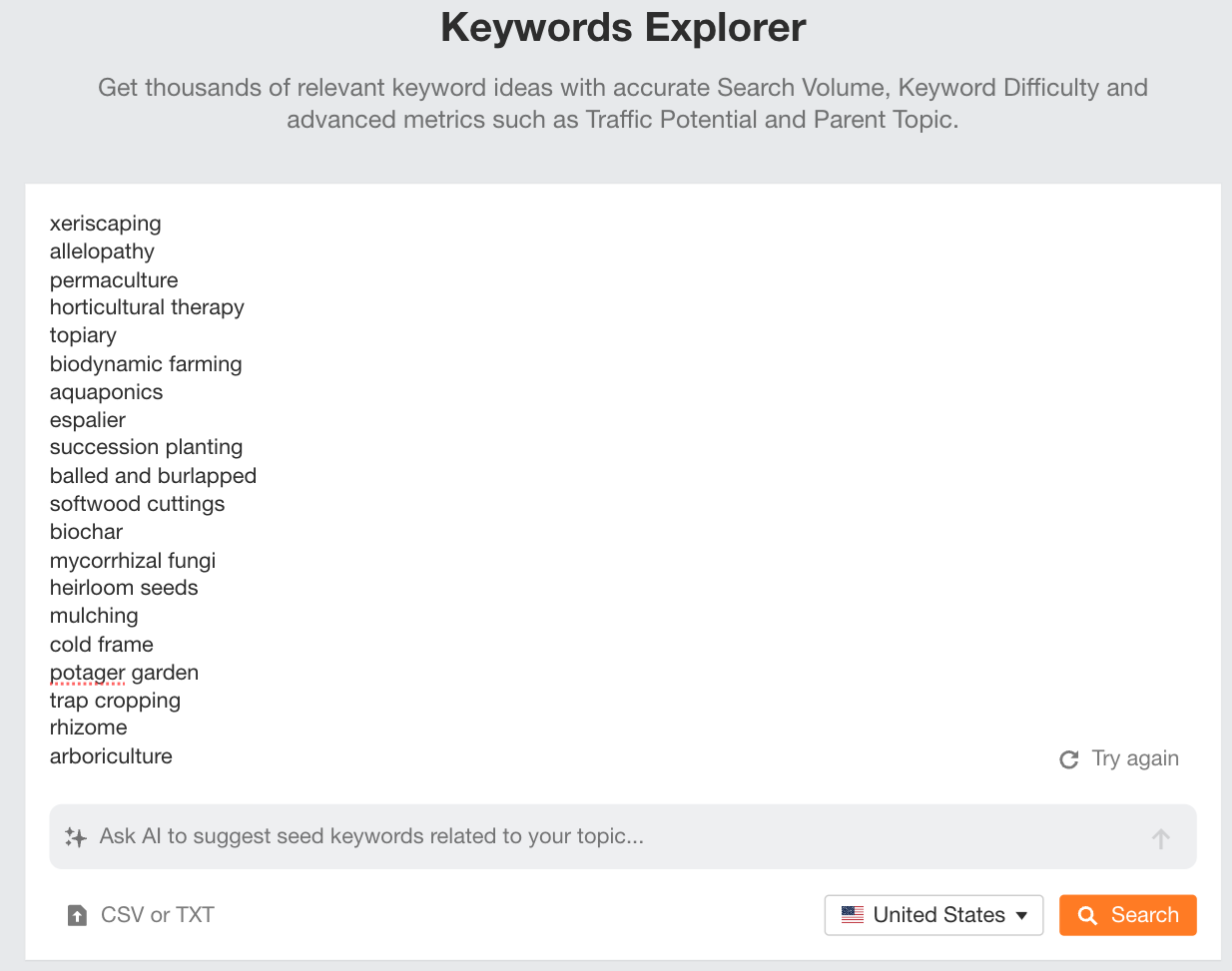 Screenshot from Ahrefs, Nov 2024
Screenshot from Ahrefs, Nov 2024
You can run with all of these ideas or cherry-pick the best ones for your site. It helps to search each in isolation to get a better feel for how easy the topic may be for your site to rank.
For example, looking at “xeriscaping” we can see this topic has a decent search volume of 7.5K searches per month and only 8 difficulty!
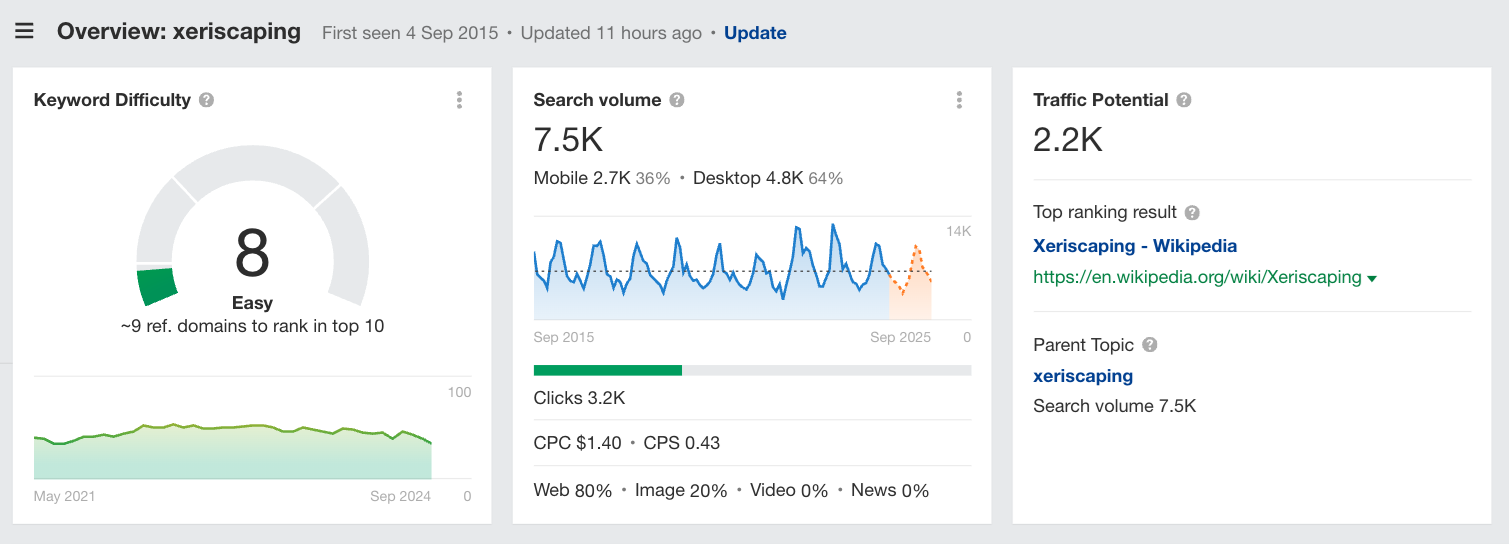 Screenshot from Ahrefs, Nov 2024
Screenshot from Ahrefs, Nov 2024
This is a great example of a niche topic with low competition levels.
Uncovering more opportunities like this is a great place for niche bloggers and small businesses to start building an audience on a low budget. It’s also great for freelancers and agencies to pitch unique content angles to clients or prospects quickly and easily.
PRO TIP: For topics with loads of related keywords, you can use the clustering feature to group keywords into potential pages.
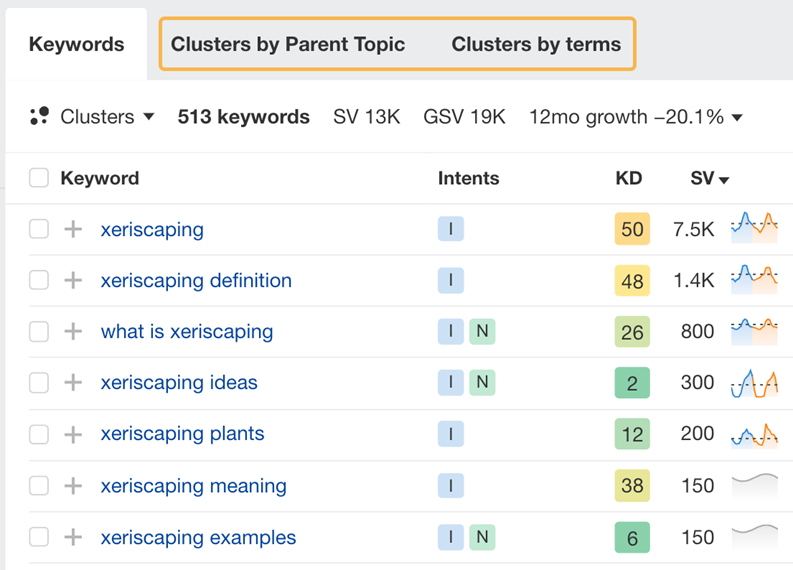 Screenshot from Ahrefs, Nov 2024
Screenshot from Ahrefs, Nov 2024
- Cluster by Parent Topic: Groups keywords that have common ranking pages on Google.
- Cluster by Terms: Groups keywords based on whether they contain the same word.
It’s often likely that one page you create will be able to rank for most keywords in a cluster, so you can further fast-track your content planning this way.
2. AI Keyword Intents
Keyword intent, also called searcher intent, is the reason why someone searches for a particular term. It’s the unconscious motivation that drives their search journey and influences what content they expect to find.
Common intents that search marketers group keywords into include:
- Informational: Looking for information, answers, or in-depth research about a specific topic.
- Navigational: Looking to visit a specific website without knowing the exact page or URL.
- Commercial: Looking to buy something but needing to do research to figure out the best brand.
- Transactional: Looking to complete a transaction online for a specific product or service.
Verifying the intent of your target keywords before you start writing content is always a good idea so that you can match the content you create to what searchers want.
In Ahrefs, you can easily filter your keyword list by the above intents and other common scenarios like branded or localized mentions:
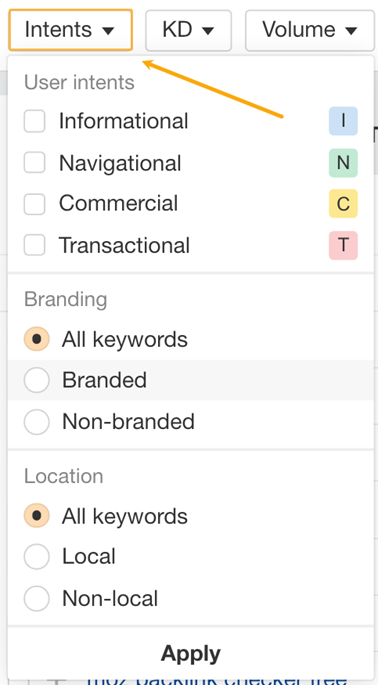 Screenshot from Ahrefs, Nov 2024
Screenshot from Ahrefs, Nov 2024
However, on their own, these classifications may not be enough to indicate exactly what type of content you should create.
For example, the intent behind the keyword “backlink checker” does not neatly fit into one of the above classifications.
Using the AI Identify Intents feature instead, you can get a more granular indication of exactly what type of content is ranking for each keyword.
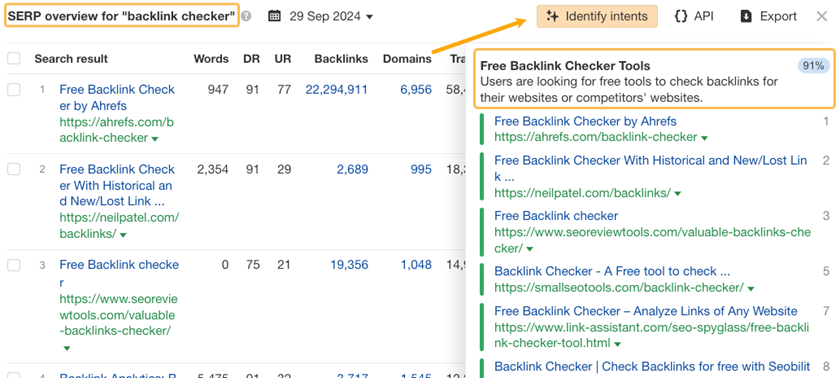 Screenshot from Ahrefs, Nov 2024
Screenshot from Ahrefs, Nov 2024
In this case, it’s pretty obvious that people want a tool to use. So, the best page to optimize should include a backlink checker tool on it.
But looking at a keyword like “laser cutter”, it’s not as obvious what the dominant intent is or what type of content would perform well.
This same feature can give you a percentage breakdown to completely take the guesswork out of what type of content is likely to rank:
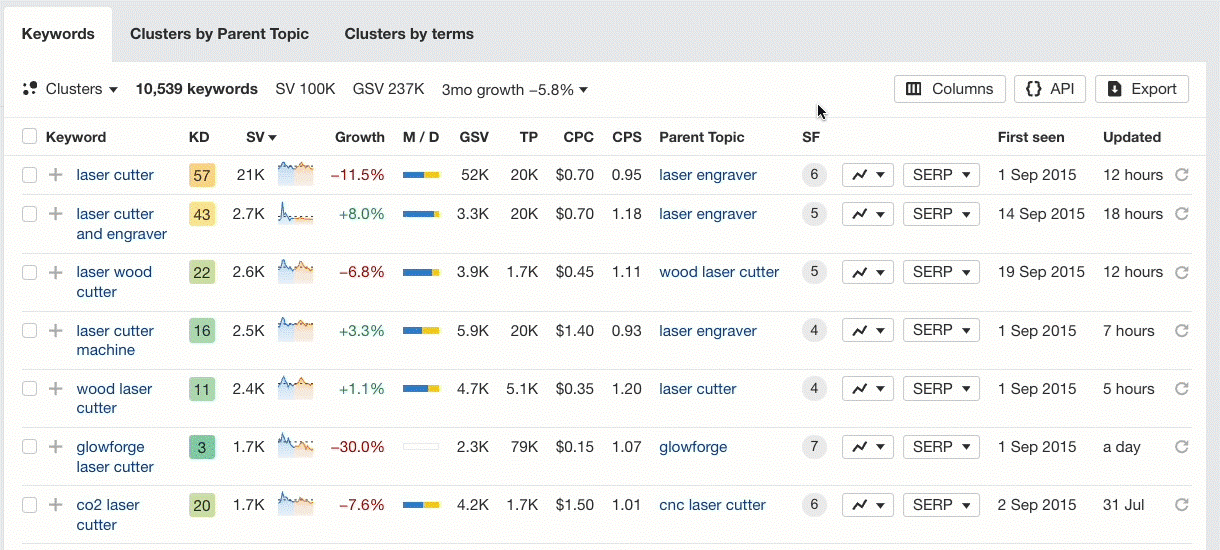 Screenshot from Ahrefs, Nov 2024
Screenshot from Ahrefs, Nov 2024
For instance, here’s the keyword intent breakdown based on content that ranks on the first page of Google results:
- 45% want to compare laser cutters
- 28% want to buy a laser cutter
- 18% want to learn about laser cutters
- 8% want to watch reviews or tutorials
- 2% want to view images of laser cutters
If you guess and get it wrong, you’ll have to allocate your limited SEO funds toward fixing the mistake (ie, rewriting your content) instead of working on new tasks.
It’s better to have data on your side confirming the intent of any keyword before you publish content with an intent misalignment.
3. AI Content Helper
Now that you have some topics to create content about and you’ve verified they align with the search intent you can fulfill, it’s time to create your content.
There are so many AI tools on the market that can help with content creation. Here’s how Ahrefs’ AI Content Helper stands out from the crowd.
- It allows you to select a specific intent to optimize for
- It helps you close topic gaps without keyword stuffing
- It scores your topical coverage as you write
For example, say you wanted to create content to target the keyword “xeriscaping”. You could select a specific intent to optimize for:
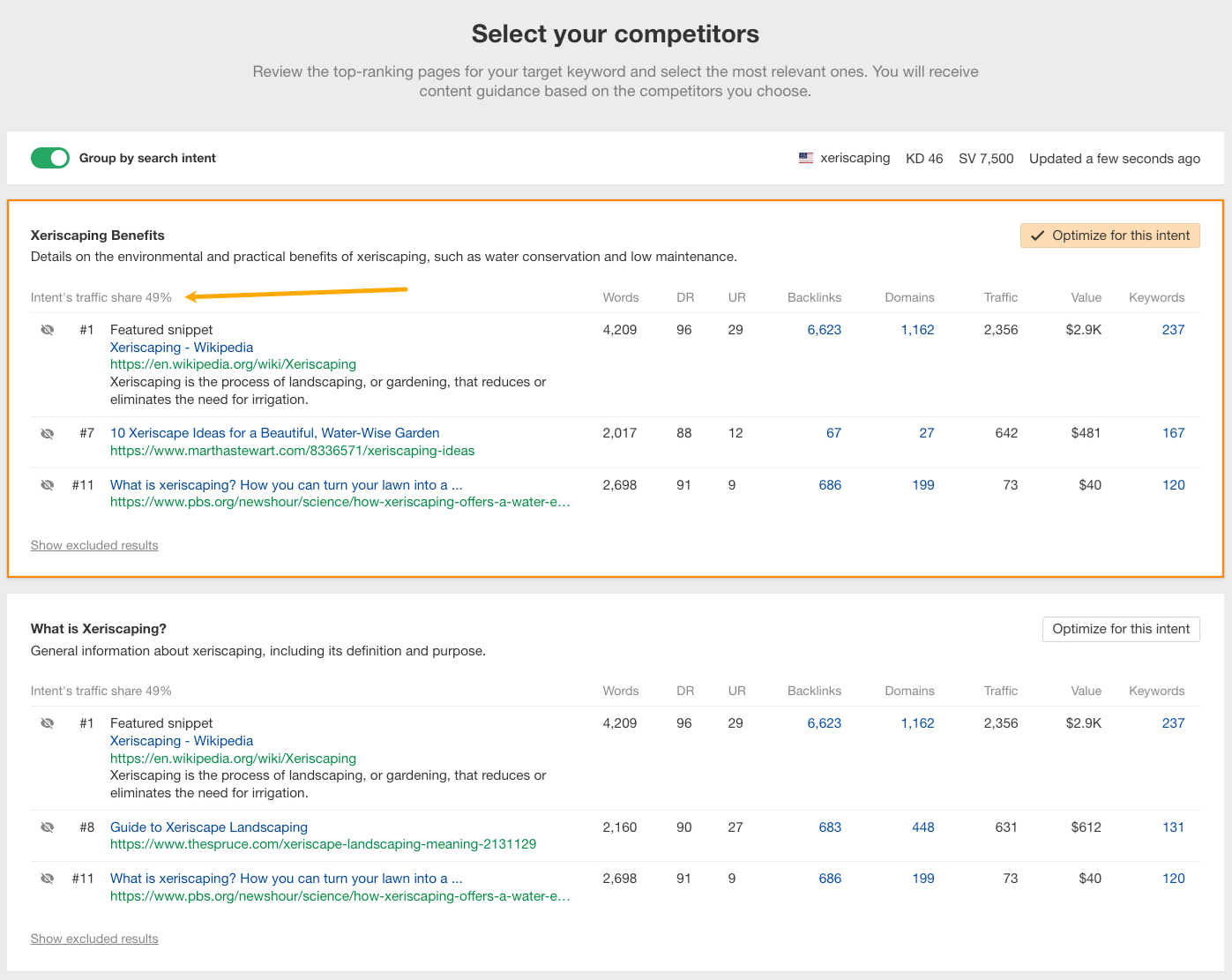 Screenshot from Ahrefs, Nov 2024
Screenshot from Ahrefs, Nov 2024
Or you could choose specific competitors you’d like to outrank:
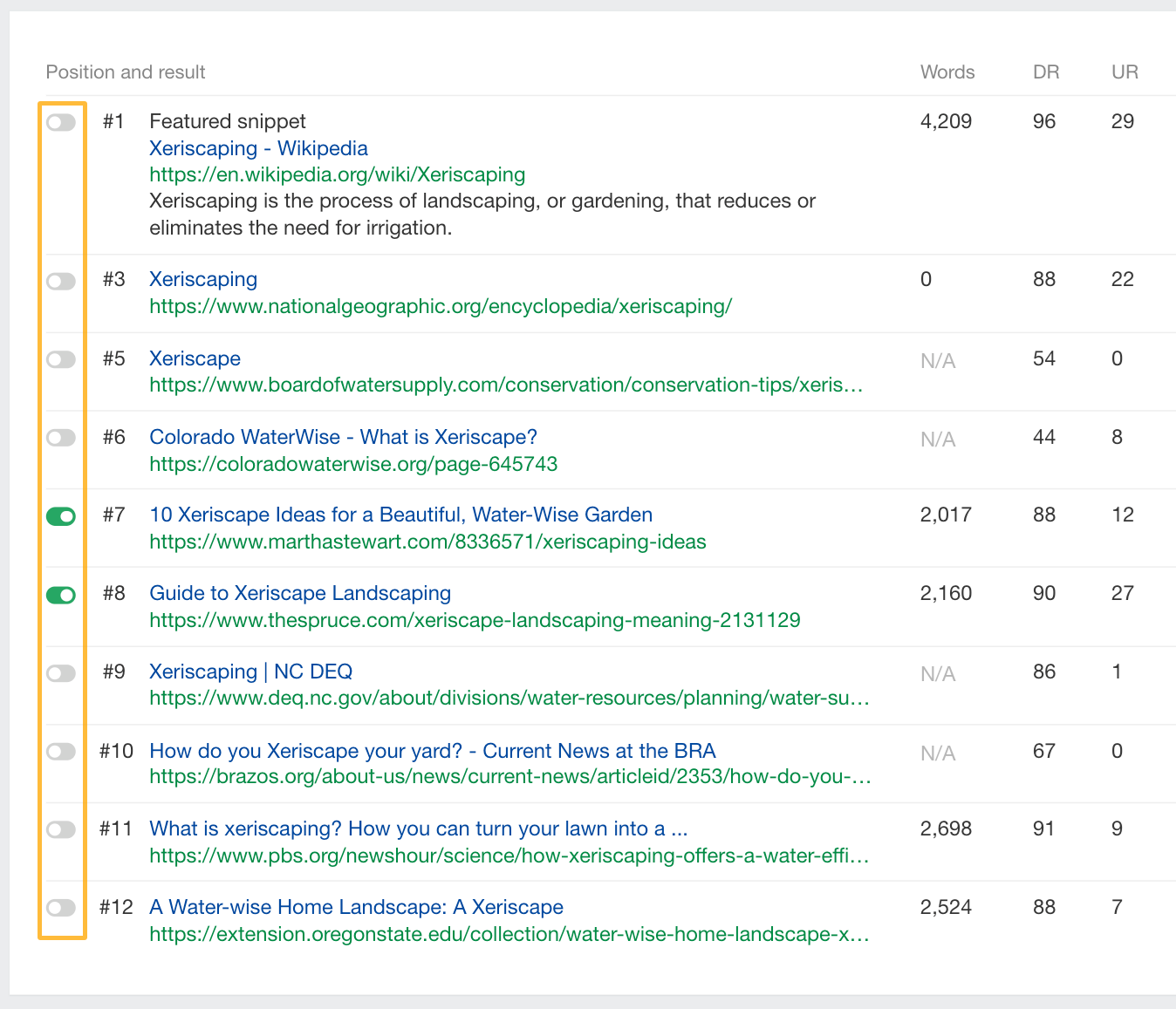 Screenshot from Ahrefs, Nov 2024
Screenshot from Ahrefs, Nov 2024
Then, as you start writing, you can check your progress against all relevant topics and competitors that match the intent you’re optimizing for:
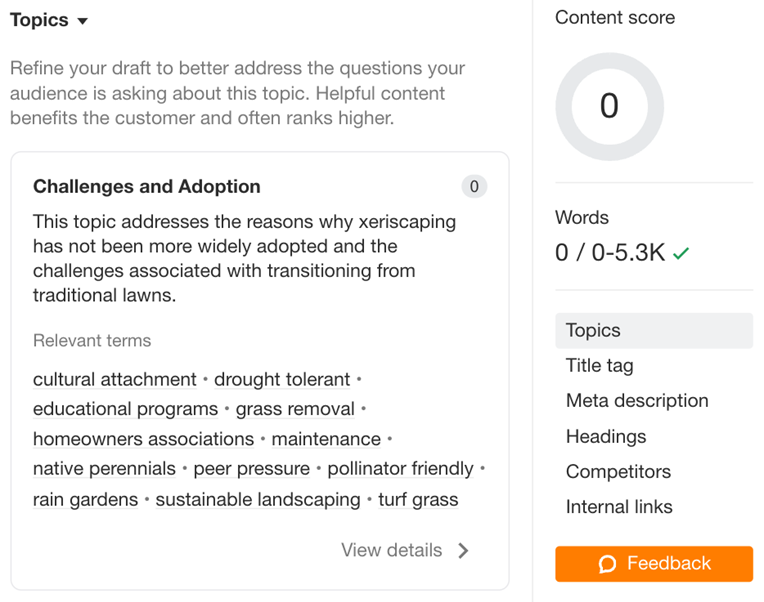 Screenshot from Ahrefs, Nov 2024
Screenshot from Ahrefs, Nov 2024
4. AI Content Grader
If you have existing content you’d like to improve, you can check out AI Content Grader instead.
Add your target keyword and existing URL:
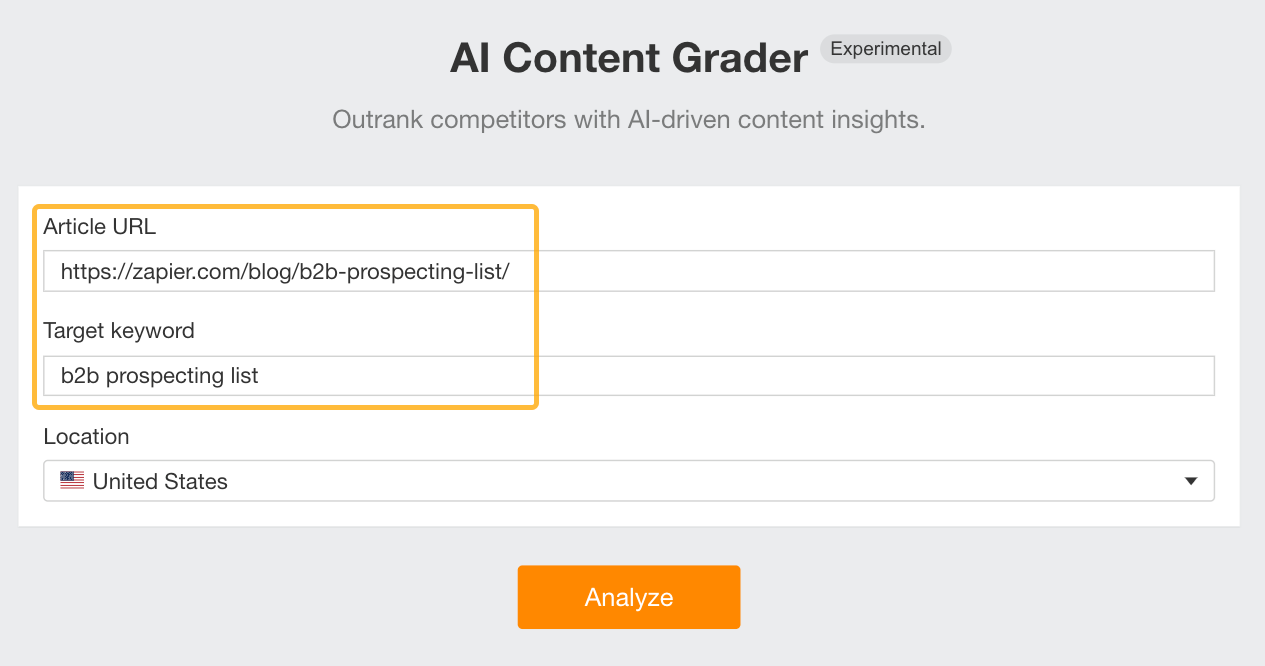 Screenshot from Ahrefs, Nov 2024
Screenshot from Ahrefs, Nov 2024
Once the report is generated, you’ll get a comparison view of your article with your top competitors.
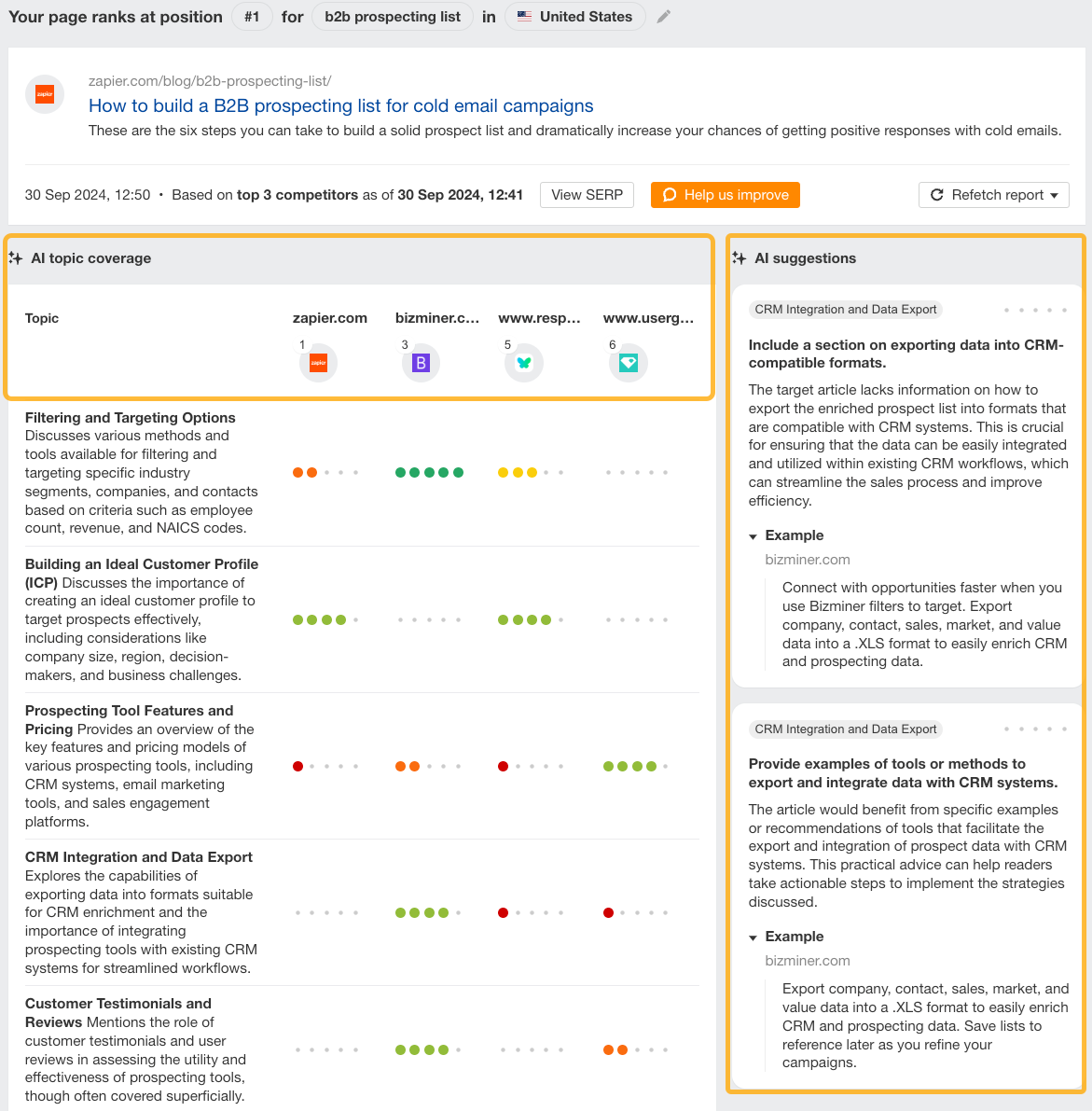 Screenshot from Ahrefs, Nov 2024
Screenshot from Ahrefs, Nov 2024
You’ll be able to see the grade for each topic and how you compare against each competitor. You’ll also get some practical AI suggestions for how to further improve your topical coverage.
This is a great way for your writers to know what sections they can add to existing content, allowing them to confidently close topical gaps without having to rewrite each post from scratch.
5. AI Keyword Translator
If you’re targeting international or multilingual audiences with your SEO strategy, Ahrefs’ AI Keyword Translator is a must-have tool in your tech stack.
Streamlining such a task by using Ahrefs allows you to:
- Test demand in new global markets quickly and easily
- Stretch a limited SEO budget across more tasks that move the needle
- 10x your strategic outcomes in a fraction of the time
It lets you translate an entire list of keywords automatically while preserving dialect nuances and local lingo.
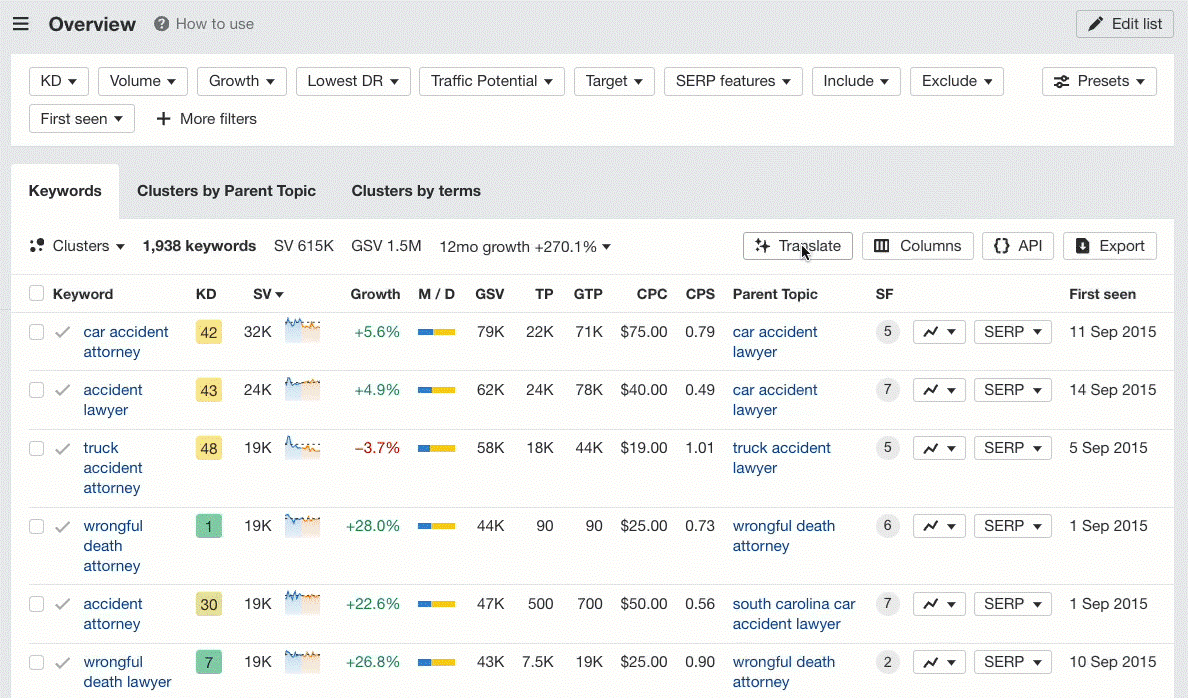 Screenshot from Ahrefs, Nov 2024
Screenshot from Ahrefs, Nov 2024
For example, there are over a dozen ways to say ‘popcorn’ across all Spanish-speaking countries and dialects.
The AI translator is able to detect the most popular variation in each country.
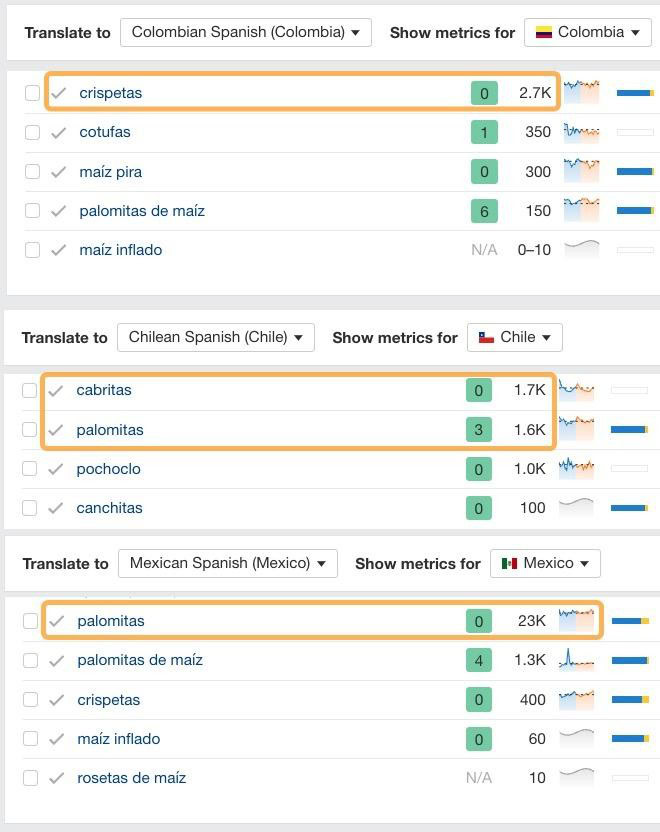 Screenshot from Ahrefs, Nov 2024
Screenshot from Ahrefs, Nov 2024
It currently offers automatic translations for 40+ languages and dialects in 180+ countries, with more coming soon.
(Bonus) Patches: Fix Annoying Tech Issues With AI
One of our most exciting upcoming features that will integrate AI is Patches.
Patches allows you to fix simple technical issues on your website with one click, and without involving a developer. It works through Cloudflare workers or JavaScript snippets.
Soon in Ahrefs: Patches
This feature will allow you to use AI to implement quick and easy fixes to maintain your content’s technical health over time.
The edits you make can be at a page level and implemented by non-technical team members.
For instance, say you have a list of pages flagged with titles that are missing, too short, or too long. Your content team will be able to use AI to correct these issues and deploy them to your website directly from the Ahrefs dashboard.
Your SEO or development teams will also be able to roll out sitewide technical fixes in similar ways.
Try Out These Ahrefs AI Features Today
SEO and content marketing can’t be automated to perfection; no AI tool can promise that.
But there are many AI use cases that speed up and improve what you’re already doing. AI can make your marketing dollar go further by saving time on busy work and removing the guesswork from your SEO strategy.
If you’re new to Ahrefs, you can try our platform for free with Ahrefs Webmaster Tools.
We also offer a low-cost Starter plan for anyone interested in going beyond the free version and taking their keyword and competitive research further.
Image Credits
Featured Image: Image by Ahrefs. Used with permission.
In-Post Image: Images by Ahrefs. Used with permission.

